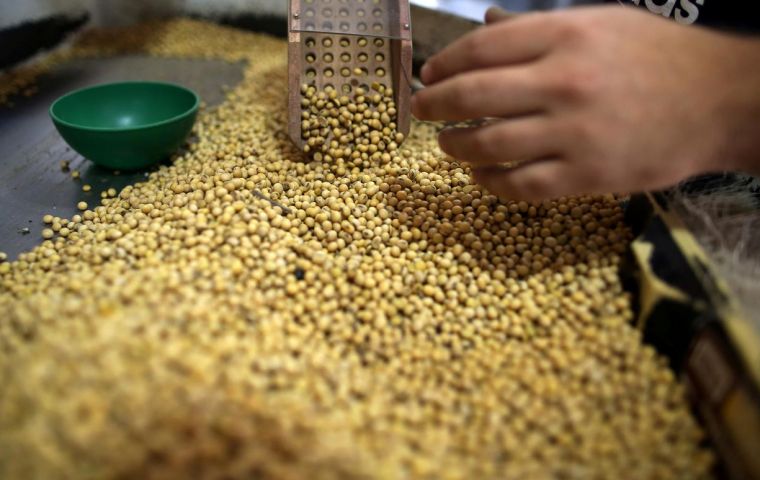MercoPress. South Atlantic News Agency
Brazil/China finalizing sanitary protocol for soy-meal exports to the Asian giant
 Soy-meal is used as livestock feed in China, and demand for soy-meal should rise in China as it restores pork production after an outbreak of African swine fever
Soy-meal is used as livestock feed in China, and demand for soy-meal should rise in China as it restores pork production after an outbreak of African swine fever Brazilian and Chinese government authorities are finalizing a protocol setting health standards for domestic processors to export soy-meal to the Asian country, André Nassar, president of oilseeds industry group Abiove, announced.
The health guidelines will allow companies to export and eventually compete with soy processors based in China, something they cannot do now. The change is happening as local processors are required to increase crushing to produce more biodiesel to boost local blending. The added output of soy-meal, a byproduct, would need new buyers.
Brazil exports a lot more raw soybeans than in meal form, and the industry would prefer a better balance, Nassar said.
Soy-meal is used as livestock feed in China and other meat producing nations, and demand for soy-meal should rise in China as it restores pork production after an outbreak of African swine fever, Nassar said.
Brazil will process an estimated 43 million tons of soybeans in 2019.
By 2023, processing will grow by an estimated 9 million tons as the government raises to 15% the mandatory quantity of bio-fuel that will be blended into diesel, Abiove projects, from 11% currently.
Nassar said Brazilian authorities were in advanced talks to finalize the health protocol to export soy-meal, though no date has been set for its announcement and implementation.
A similar protocol is in place for the sale of cotton meal from Brazil to China, he said.
Abiove does not expect China to stop buying soybeans and start buying Brazilian meal once the protocol is in place, Nassar said.
“2020 will be the year when we will open new markets. There is still hard work to do to sell products of higher aggregate value,” Nassar said.
The European Union buys about half of Brazil’s soy-meal, or 8 million tons. Brazilian soybean exports is expected to total 72 million tons this year, with about 80% going to China, Abiove said.




Top Comments
Disclaimer & comment rulesCommenting for this story is now closed.
If you have a Facebook account, become a fan and comment on our Facebook Page!